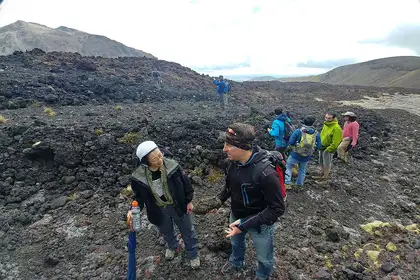
An international group of volcanologists exploring New Zealand's unique volcanic zone.
How accurately can we forecast the hazards and impacts of volcanic eruptions? How can we advance our computational modelling techniques to mitigate effectively against volcanic fatalities?
These were the questions volcanologists from across the globe were addressing, when they gathered in New Zealand in early January to debate and discuss the latest developments in volcanic hazard modelling, during the first international volcanic hazard benchmarking and validation exercise.
The International Association of Volcanology and Chemistry of the Earth’s Interior (IAVCEI) workshop was initiated and hosted by Associate Professor Gert Lube from Massey and his Physical Volcanology Group, thanks to a Marsden Fund grant.
It began with an official Māori welcome from Ngāti Tūwharetoa, with the first three days devoted to global volcano models. These were followed by field excursions to the Taupo caldera and Mt Ngauruhoe and Mt Tongariro, and a joint-eruption simulation at the Massey campus.
The main focus of the workshop was on pyroclastic flows - hot, fast-moving mixtures of particles and gas which form during volcanic eruptions and are the most dangerous of volcanic phenomena. This was discussed in-depth during the workshop held at both the Tauhara Centre in Taupo and Massey’s Manawatū campus
Dr Lube says Massey is leading this area internationally through the University’s funded research programmes.
“The main objective of the workshop is the development of the international guidelines for modelling and mitigation of volcanic pyroclastic flow hazards. The international benchmark is a Massey-led initiative, in collaboration with American, and Italian volcanologists, to inter-compare, validate and advance existing and future hazard models globally,” he says.
“The workshop was attended by twenty of the global leaders in this field and assembled a mix of highly esteemed and emerging researchers. By establishing this workshop, we are now taking the next step to gather together experts to develop the work further and showcase Massey’s research to an international audience.”
Other objectives of the workshop included the advancement of novel volcano monitoring techniques between countries, facilitated through a joint large-scale eruption simulation at Massey where international researchers tested new sensor techniques, as well as identifying the future challenges in global volcanic hazard studies and strategic planning of large multi-national research programmes for the next 5-10 years to address these challenges.
Safety around the world
Professor Michael Manga from the University of California, Berkeley, says the work is important for safety around the world.
“We would like to be able to predict where they [pyroclastic flows] go and their consequences, and to do so, we need models to help us make decisions. So, we are here to think about how to design better models, and how to test those models. Validation and verification. There are two highlights. Personally, getting to see some of the most beautiful and amazing volcanic deposits is special. There’s nothing like seeing a real rock to understand how the earth works. Professionally, it’s the chance to work with some of my colleagues and see what’s going on here at Massey University,” he says.
“I think we have a vision that long-term we will forecast these flows and their consequences like we do the weather.”
Professor Greg Valentine from the University of Buffalo, New York, says, “We have got to the point now where everything we are doing in trying to understand volcanic eruptions is really inter-disciplinary, so it’s really necessary with people with expertise in different approaches and topics to talk together. This workshop has been really great for that.”
Attendees included Professor Michael Manga (University of California, Berkeley), Professor Joe Dufek (University of Oregon), Professor Greg Valentine (University of Buffalo), Professor Augusto Neri, Associate Professor Esposti-Ongaro and Dr Cerminara (INGV Pisa), Professor Roberto Sulpizio (University of Bari), Associate Professor Ulrich Küppers (University of Munich), Professor Gaku Ichihara and Professor Takehiro Koyaguchi (University of Tokyo), Associate Professor Brittany Brand and Dr Nick Pollock (Boise State University), Dr Sanchez (University of Florence), Associate Professor Sylvain Charbonnier (University of Florida) and Associate Professor Olivier Roche (Universite Blaise-Pascal, Clermont-Ferrand).